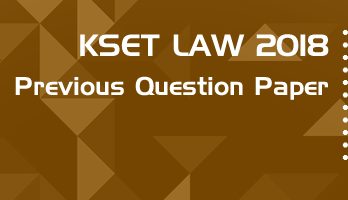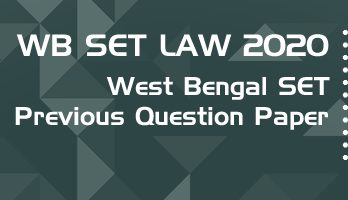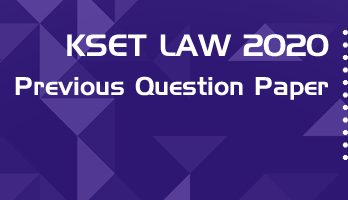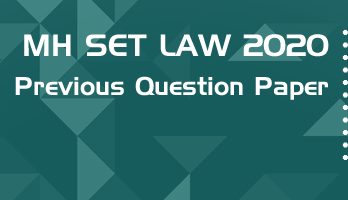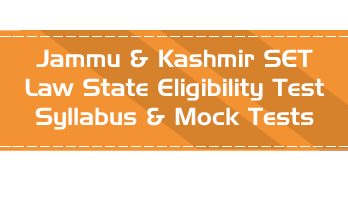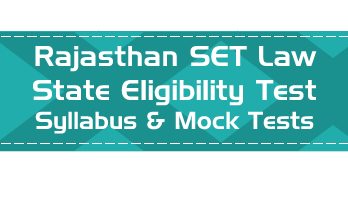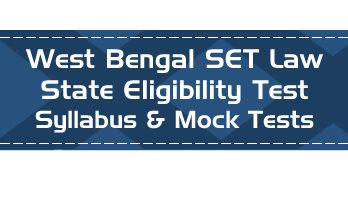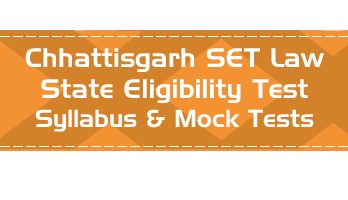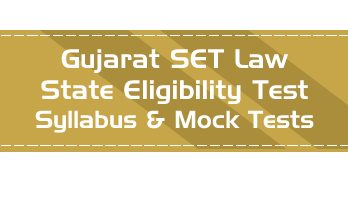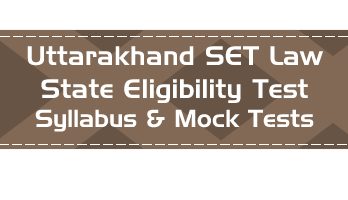- Based on latest West Bengal State Eligibility Test Law Paper II Syllabus
- Law Subjects Overview Material covering important topics and concepts - 650 page PDF Book
- 50 Full Length Mock Tests - New Pattern Paper II, with 100 questions each
- 50 Mini Practice Mock tests - with 25 questions each
- Unlimited Practice - New Questions in every mock test with every attempt
- Answer choices of all questions shuffled randomly for better practice
- Database of over 9500 MCQs covering the entire syllabus
- Includes new comprehension based questions
- Questions & Answer Choices randomly shuffled in every attempt for better practice
- Accessible 24 x 7 via Smart-Phone browsers and Desktops
"Just wanted to let you know that I have cleared JRF with 99.99th percentile. Thank you for all your help and support that made it possible. " - Kanchan Yadav
"Thank you so much for the UGC NET test series. I finally qualified the exam. It was possible because of the mock test series provided by your team." - Robin Jaiswal
1. The Preamble to the Constitution of India provides
(A) Liberty of Thought, Belief, Expression, Faith and Worship
(B) Liberty of Thought, Expression, Belief, Faith and Worship
(C) Liberty of Expression, Thought, Belief, Faith and Worship
(D) Liberty of Faith, Worship, Expression, Thought and Belief
2. The objectives specified in the Preamble of the Constitution of India contain the basic structure of our Constitution cannot be amended in exercise of the power under Article 368 of the Constitution of India, held in
(A) Bhim Singhji v. Union of India
(B) State of Punjab v. Balbir
(C) Amar Singh v. State of Rajasthan
(D) Masthan Sahib v. Chief Commissioner
3. According to Article 1(3) of the Constitution of India, the territory of India shall comprise
(A) the territory of the states.
(B) the Union territories specified in the First Schedule.
(C) such other territories as may be acquired.
(D) All of the options are correct
4. An instrumentality or agency of the State having operates in India
(A) is a State under Article 12 of the Constitution.
(B) is a State under Article 366 of the Constitution.
(C) is a State under Companies Act 2013.
(D) is a State under law of agency.
5. According to Article 13 (3) (a) of the Constitution of India, “law” includes
(A) Rule, Ordinance, Order, Legislation, Custom, Case law
(B) Rule, Regulation, Notification, Custom, Usage, Supreme Court decisions
(C) Ordinance, Delegated law, Rule of law, Regulation, Notification, Custom or usage
(D) Ordinance, Order, Bye-law, Rule, Regulation, Notification, Custom or usage
6. India is a Sovereign because
(A) it contains more than 300 Articles in the Constitution of India.
(B) its Supremacy in deciding matters internal as well as external interest of the country.
(C) it has promises for justice.
(D) it has a government for the people by the people of the people.
7. Which Articles of the Constitution of India deals with adult suffrage?
(A) Article 320
(B) Article 326
(C) Article 225
(D) Article 226
8. In case there is a conflict between the Preamble and other provision of the Constitution of India:<br>(A) the Preamble will prevail.<br>(B) other provision will prevail.
(A) A is correct
(B) B is correct
(C) Both of the above go side by side.
(D) interpretation by the Supreme Court will prevail subject to basic structure.
9. The expression “Hindu” in Article 25 of the Constitution of India include
(A) Jains
(B) Sikhs
(C) Buddhists
(D) All of the options are correct
10. The Sarkaria Commission was appointed in India for examining the Centre and State relation which recommended<br>(A) adjustment in the administrative or functional relation between the Centre and State.<br>(B) greater decentralisation in the decision making and execution upto the village level.
(A) A only
(B) B only
(C) None of the statements
(D) Both of the statements
11. Fundamental rights under the Constitution of India
(A) can be claimed by citizens only.
(B) can be claimed by citizens as well as non-citizens.
(C) some of them can only be claimed by the citizen of India, but other apply equally to non-citizens.
(D) it is the discretion of the Supreme Court, only case to case be applied.
12. When President is to be impeached for violation of Constitution of India, the challenge shall be preferred by
(A) Lok Sabha
(B) Rajya Sabha
(C) Either house
(D) None of the options
13. Under the Constitution of India, the directive principles of state policy are contained in
(A) Part IV, under Articles 36 – 51
(B) Part IV, under Articles 37 – 51
(C) Part V, under Articles 36 – 51
(D) Part V, under Articles 37 – 51
14. In which of the following Articles of the Constitution of India provides for right to free legal aid?
(A) Article 39 (A)
(B) Article 38 (A)
(C) Article 48 (A)
(D) Article 40 (A)
15. Organisation of village Panchayat is a directive principle of state policy. Which of the following amendment is a major step in this regard?
(A) 72nd and 73rd amendment
(B) 62nd and 64th amendment
(C) 60th and 61st amendment
(D) All of the options are correct
16. The Vice-President shall hold office for a term<br>(A) of six years from the date of which he received the letter.<br>(B) of five years from the date on which he enters upon his office.
(A) A only
(B) B only
(C) Either (A) or (B)
(D) None of the options
17. The President’s resignation has to be addressed to the Vice-President, who shall forthwith communicate the same to,
(A) Speaker of the House of People
(B) Speaker of the Rajya Sabha
(C) Chief Justice of India
(D) Prime Minister of India
18. Read Assertion (A) and Reason (R) and with the help of codes given below, point out the correct explanation.<br>Assertion (A): A legal right is a legally protected interest.<br>Reason (R): An element of advantage is essential to constitute right.
(A) Both (A) and (R) are true, and (R) is the correct explanation of (A).
(B) Both (A) and (R) are true, but (R) is not the correct explanation of (A).
(C) (A) is true, but (R) is false.
(D) (A) is false, but (R) is not true.
19. Which of the following statement(s) is true?
(A) Law consist of rules in accordance with reason and nature has formed the basis of imperative law.
(B) Natural Law is a type of command.
(C) Law, according to positivist, is made through medium of courts.
(D) Hart talks in terms of conduct supplemented by an attitude of mind to the effect that the conduct in question is obligatory because it is required by rule.
20. Match List-I with List-II and select the correct answer using the codes given below:<br><br>List-I<br>(1) Utilitarian individualism<br>(2) Social Engineering<br>(3) Social Solidarity<br>(4) Social Utilitarian<br><br>List-II<br>(i) Duguit<br>(ii) Ihering<br>(iii) Bentham<br>(iv) Roscoe Pound<br><br>Codes:(1) (2) (3) (4)
(A) (i) (ii) (iii) (iv)
(B) (ii) (iii) (iv) (i)
(C) (iii) (iv) (i) (ii)
(D) (iii) (ii) (iv) (i)
21. According to Eugen Ehrlich, the main source of legal development is
(A) Legislation
(B) Juristic Science
(C) Judicial decision
(D) Society
22. About the influence of morals on law one of the following jurist observed, “The law of every modern state shows as at a thousand points the influence of both the accepted social morality and wider moral ideals.”
(A) Salmond
(B) Hart
(C) Korkunov
(D) Bentham
23. Which of the following is incorrectly matched?
(A) Fuller – inner morality
(B) Bentham – utilitarianism
(C) Maine – status of contract
(D) None of the options
24. ‘Corporation aggregate’ means
(A) incorporated series or successive persons.
(B) an incorporated group of co-existing persons.
(C) legal personality has been conferred upon a fund dedicated for a special purpose.
(D) None of the options
25. Norm is the meaning of an act by which certain behaviour is commanded, permitted or authorise. Who amongst the following gave above definition of norm?
(A) Austin
(B) Bentham
(C) Kelsan
(D) Holland
26. _______ means ‘a precept or rule of action imposed upon men by some authority which enforces obedience to it’.
(A) Natural or moral law
(B) Conventional law
(C) Imperative law
(D) Customary law
27. The Indian Constitutional basis of the doctrine of precedent is found in
(A) Article 12 of the Constitution of India
(B) Article 136 of the Constitution of India
(C) Article 141 of the Constitution of India
(D) Article 21 of the Constitution of India
28. Which of the following is/are the correct mode(s) of acquisition of possession?
(A) Taking
(B) Delivery
(C) By operation of law
(D) All of the options
29. A’s right to enjoy his legally possessed land is a
(A) right to land
(B) moral right
(C) right to REM
(D) right to personam
30. Duties without a corresponding rights are called
(A) Absolute duty
(B) Relative duty
(C) Secondary duty
(D) None of the options
31. Who is considered as father of international law?
(A) Gortious
(B) Gentilis
(C) Austin
(D) Jermy Bentham
32. According to Austin, international law lacks<br>(A) a determinant superior political authority and effective legislative and executive machinary.<br>(B) corrective enforcement agency and a potent judiciary.
(A) A only
(B) B only
(C) None of the options
(D) Both (A) and (B)
33. Who wrote the book “Mare Liberum”?
(A) Grotius
(B) Liberaze
(C) Holland
(D) Maine
34. Who defined treaties as “Treaties are agreements between subjects of international law creating a binding obligation in international law”?
(A) Oppenheim
(B) Schwazanbargar
(C) Austin
(D) Viner
35. “Customary norms, may be created by means of treaty”, was rendered by ICJ in
(A) North sea continental shelf case
(B) Paquete v. Habana
(C) Altmarke case
(D) None of the options
36. General principles of law recognised by civilized states are
(A) specifically codified law.
(B) the basic or fundamental principles of which UN charter is based.
(C) principles common to the municipal law of all civilized nations.
(D) None of the options
37. The principles of ex-aqued-et-bono is enshrined under Article
(A) 38(1) of the Statute of ICJ.
(B) 38(1)(a) of the Statute of ICJ.
(C) 38(2) of the Statute of ICJ.
(D) 38(5) of the Statute of ICJ.
38. According to Constitutive theory
(A) unrecognised state has rights or duties at international law.
(B) unrecognised state has no rights or duties at international law.
(C) Recognition is of no consequence of international law.
(D) None of the options
39. De jure recognition
(A) can not be withdrawn.
(B) can be withdrawn if more than 5 states consent thereto.
(C) revocable if coup takes place.
(D) on the condition of granting de facto one can withdraw de jure recognition.
40. The retiring age of a Judge of the International Court of Justice is
(A) 65 years
(B) 62 years
(C) 63 years
(D) No retiring age
41. Rights of Minorities has been recognised in
(A) Article 27 of the 1966 ICCPR
(B) Article 26 of the UN Charter
(C) Article 26 of the 1948 Universal Declaration of Human Rights
(D) Article 25 of the 1960 Convention of Prohibition of Discrimination
42. Arunachal Pradesh State Human Rights Commission was established on
(A) 10 December, 2015
(B) 10 December, 2016
(C) 10 December, 2017
(D) None of the options
43. The Tobar doctrine is also known as
(A) The doctrine of effectiveness
(B) The doctrine of legitimacy
(C) The doctrine of separation
(D) The doctrine of simplicity
44. The Tobar doctrine was propounded in the year
(A) 1901
(B) 1919
(C) 1907
(D) 1942
45. Third generation of human rights includes
(A) rights relating to equality and justice
(B) rights of “fraternity” or “solidarity”
(C) rights relating to freedom
(D) None of the options
46. Quran was given to the world in fragments, during a period of
(A) 20 years
(B) 21 years
(C) 23 years
(D) 26 years
47. Direction: Point out incorrect response. The essentials of Muslim marriage are
(A) proposal and acceptance
(B) competent parties
(C) writing and religious ceremony
(D) no legal disability
48. In which of the following case, the Privy Council said that nikah (marriage) under the Muslim Law is a religious ceremony?
(A) Abdul Kadir v. Salima
(B) Anis Begum v. Mohammad Istafa
(C) Hassan Kutty v. Jainbha
(D) Shoharat Singh v. Jafri Begum
49. Under Shia Law, marriage with the fifth wife is
(A) Valid
(B) Irregular
(C) Voidable
(D) Void
50. Where a muslim husband who has attained majority and is of sound mind, swears by God that he will not have sexual intercourse with his wife and leaves the wife to observe iddat, he is said to make
(A) Ila
(B) Zihar
(C) Talaq-e-Tafweez
(D) Talaq-e-Taliq
… Subscribe to our online mock tests & previous paper series for the full question paper, with answer key.
- Based on latest West Bengal State Eligibility Test Law Paper II Syllabus
- Law Subjects Overview Material covering important topics and concepts - 650 page PDF Book
- 50 Full Length Mock Tests - New Pattern Paper II, with 100 questions each
- 50 Mini Practice Mock tests - with 25 questions each
- Unlimited Practice - New Questions in every mock test with every attempt
- Answer choices of all questions shuffled randomly for better practice
- Database of over 9500 MCQs covering the entire syllabus
- Includes new comprehension based questions
- Questions & Answer Choices randomly shuffled in every attempt for better practice
- Accessible 24 x 7 via Smart-Phone browsers and Desktops
"Just wanted to let you know that I have cleared JRF with 99.99th percentile. Thank you for all your help and support that made it possible. " - Kanchan Yadav
"Thank you so much for the UGC NET test series. I finally qualified the exam. It was possible because of the mock test series provided by your team." - Robin Jaiswal


